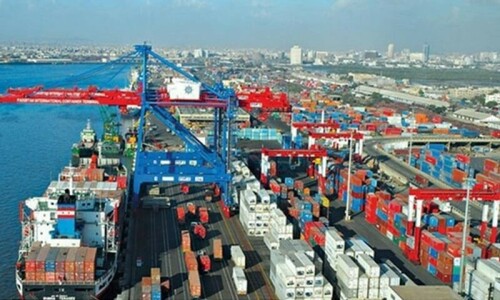Pakistan’s largest-ever population census kicked off on Wednesday in 63 districts of the country after a delay of 19 years.
High security was in place as thousands of enumerators backed by the military began the enormous, politically-charged count.
The weeks-long process will deploy a team of more than 300,000 people and involve 55 million forms — as well as a second, separate form distributed by the military.
“It's a very hectic process, but we are ready for it,” Nadeem Ehsan, a teacher clad in a yellow Pakistan Census 2017 jacket in Peshawar, told AFP.
“We had some reservations about security initially but we were assured about it by the government,” he added, describing the process as a “noble cause”.
Fast-growing Pakistan is the sixth most populous country in the world, with an estimated 200 million people, but has not held a census since 1998 due to years of bickering between politicians.
The count will be the basis for revising political boundaries, parliamentary seat allocations and finances as the country gears up for a national election next year — a prospect that has raised fears over power bases and federal funding.
Punjab, for example, could see its political grip weaken as a result of its population not rising at a similar rate to other provinces.

And ethnic Baloch people fear they will become a minority in their own province, sparsely-populated Balochistan, due to an influx of Pashtuns — including refugees from Afghanistan whose nationality is difficult to determine due to falsified documents.
The count will also give a clearer picture about religious minority numbers in the Muslim-majority country as well as numbering the transsexual population for the first time.
The Pakistan Bureau of Statistics (PBS) will deploy some 119,000 people, including 84,000 enumerators: teachers and local officials who will go door-to-door to count homes and then individuals.
Pakistan Army will dispatch up to 200,000 troops for the exercise, including 44,000 participating directly in the census-taking and making a parallel count using a second form.
Asif Bajwa, the PBS's chief statistician, said the army would act as 'observers' to ensure enumerators did not inflate local counting.
But that has created some disquiet for the UN, who are concerned about the army's role as parallel data collectors.
The first census phase will take place from March 15 to April 15, the second from April 25 to May 25, and final results are expected by the end of July. In the second phase, 87 districts will be covered.

Concerns about the census
The major concern raised over the conduct of the census is from three provinces — Sindh, Balochistan and Khyber Pakhtunkhwa — and related to internal migration. A similar concern has been voiced by temporarily displaced tribal people. It is not clear whether the internally displaced persons will be counted in their native areas or where they are living at present.
The Balochistan National Party-Mengal and the Muttahida Qaumi Movement-Pakistan have filed petitions in the superior courts regarding their concerns on the census, Dawn reported.
The National Database and Registration Authority (Nadra) has blocked 350,000 computerised national identity cards (CNICs) ahead of the first phase of the census.
Bajwa claimed that most of the blocked CNICs belonged to Afghan nationals. However, he added, the census would cover all people living in the country irrespective of their ethnicity or nationality. Foreign nationals would also be registered.
However, in the census reports only those Afghans will be counted who have valid Pakistani CNICs and the rest will be left out. The PBS will use Nadra database to check fake CNICs.
On internal migration, he said people who had migrated from one province to another and stayed there for more than six months would be counted as part of the population of the host province.
The first census in the country was conducted in 1951, the second in 1961, the third in 1972, instead of 1971 due to political turmoil, and the fourth in 1981. The fifth census, which was due in 1991, was conducted in March 1998 with the help of the army.
The census is considered to be one of the basic elements for judicious distribution of resources, calculating representation in parliament, electoral processes, tax collection, tackling civic issues, including growing urbanisation, and evaluation of resources for infrastructure development.
Under the constitution, the government is bound to conduct census every 10 years.














































